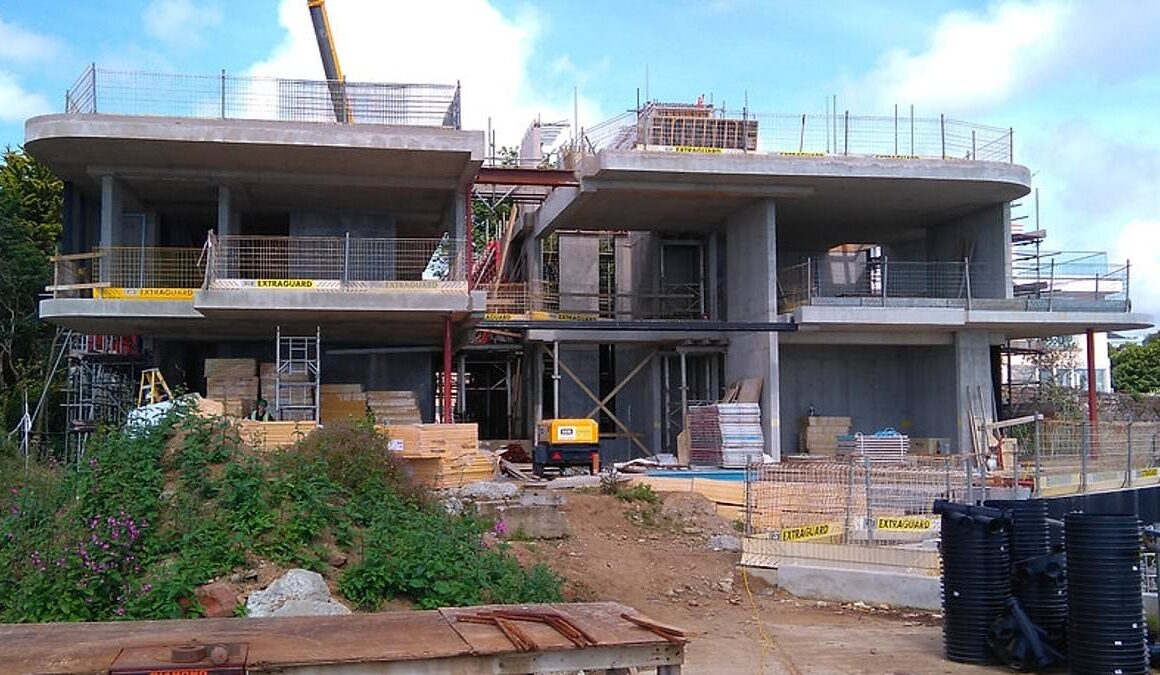An award-winning architect has been suspended after he got into a bitter row with the owner of an £11million Grand Designs-style house who complained he couldn’t see the sea from his swimming pool.
Renowned architect Jamie Falla was hired in 2013 by a wealthy client to build a lavish coastal home in the Channel Islands, a tribunal heard.
The original estimate for the cost for building the huge modernist property in Guernsey was £2million.
However, the disciplinary hearing was told that costs have since ballooned to over £11million.
Mr Falla was accused of a series of failings by the home’s owner and their relationship became ‘strained’ over arguments related to his fees which ballooned to more than £200,000.

Renowned architect Jamie Falla (pictured) was hired in 2013 by a wealthy client to build a lavish coastal home in the Channel Islands, a tribunal heard. Mr Falla was accused of a series of failings by the home’s owner

The original estimate for the cost for building the huge modernist property in Guernsey was £2million

The disciplinary hearing was told that costs have since ballooned to over £11million
The client complained that the view of the sea from the swimming pool is obstructed by trees, rooms in the house overheated thanks to faulty windows and did not have air conditioning, and that ‘ Tesla Powerwalls’ weren’t built correctly.
Things got so hostile that at one stage the client threatened to throw the experienced architect off his second-floor balcony, the Architect’s Registration Board (ARB) heard.
The project is still unfinished, 11 years later.
Now, Mr Falla, an architect of over 25 years who has built a number of stunning properties in the Channel Islands, has been suspended for two years after being found guilty of unacceptable professional conduct.
The tribunal was told the property’s owner – who was unnamed but described as ‘an exacting client with a robust management style’ – wanted to build a house to ‘retire and live in his later years’.
He purchased the property – Sea Lodge – in Fort George, St. Peter Port, Guernsey, and contacted Mr Falla in 2013 to start work, having hired him before in 2007.
‘The intention was to create a minimalist property which was architecturally ”sharp” in its design,’ the panel heard.
‘The project was a high value project, with [Mr Falla’s] fees initially being proposed at £80,000 and then £400 a day for project management’, a tribunal report said.
‘The estimated build cost was £2million. Costs have since increased to over £11million on the construction, excluding professional fees.
‘Issues arose about fees almost immediately and there was extensive correspondence on this issue.’
It was heard ‘numerous issues regarding Mr Falla’s fees persisted’ over the first few years but became a ‘significant issue’ in 2017 when his fee increased to £218,000.
‘It appears that the relationship between [them] was, by this stage, very strained’, the report said.
‘The relationship appears to have completely broken down in September 2017.
‘[The client] stated that [Mr Falla] caused a project manager, appointed in 2017, to ‘throw in the towel’ and [his] work had constant shortcomings.’

Mr Falla was accused of a series of failings by the home’s owner and their relationship became ‘strained’ over arguments related to his fees which ballooned to more than £200,000

The tribunal was told the property’s owner – who was unnamed but described as ‘an exacting client with a robust management style’ – wanted to build a house to ‘retire and live in his later years’

He purchased the property – Sea Lodge – in Fort George, St. Peter Port, Guernsey, and contacted Mr Falla in 2013 to start work, having hired him before in 2007

‘The intention was to create a minimalist property which was architecturally ”sharp” in its design,’ the panel heard
The client lodged his first official complaint in 2018, which was followed by many more and in 2019 they reached a settlement agreement.
However, parties continued to work together and issues continued until they stopped in March 2022.
An expert quantity surveyor said remedial works to fix issues with the property would cost £800,000.
The tribunal heard one of the main issues was with the swimming pool.
The client wanted a ‘panoramic’ view of the sea out to Herm Island from his pool, however Mr Falla failed to warn him his neighbours’ trees would impede it.
The ARB panel said: ‘The Committee noted that the view was a fundamental design feature. The swimming pool was positioned specifically to take advantage of the view but was significantly impeded by the neighbours’ trees.
‘The Committee accepted [expert evidence] that a reasonable architect would have recognised the potential for the existing trees to impede the view and would have explicitly warned the [client] of this.’
The tribunal also heard an outdoor gate didn’t close properly, ceiling plasterboards didn’t have double layers, and standing water was left within gutters.
Overheating was also an issue.
‘The windows were installed without an adequate solar gain coating,’ it was heard.
‘The property was not equipped with air conditioning in many of the rooms and some of the windows had restricted openings.
‘Furthermore, there is no record of [Mr Falla] having sought to obtain written assurances as requested. This caused overheating of the property, discomfort to the [client] and damage to furnishings.’
The panel was told Tesla Powerwalls – home batteries which store energy – weren’t installed to the correct height, air con wasn’t installed in many rooms, wire balustrades were not built adequately, and one underground had to be waterproofed retrospectively after it suffered from damp.
It was heard that although it is still not finished, the client moved into the property.
The property is connected to Lavinia Holdings Ltd, property records show.
At the tribunal, Mr Falla denied all allegations.
He said he ‘acted professionally throughout the project’ and said complaints were not ‘justified’.
He claimed the client ‘was the only person he had ever received a complaint from in 25 years’.
He even alleged the client ‘threatened to throw him off a second-floor balcony’ and that problems were due to the ‘complexity’ of the project and the client’s ‘reluctance to follow the regulations’.
The panel found him guilty of five counts of serious misconduct.
These were failure to act with due skill and care, acting dishonestly and lacking integrity, failure to issue adequate terms of engagement, failure to act without undue delay, and entering into an agreement that prevented the client from raising concerns with the ARB.
The panel said: ‘Five of the failings were found to be serious, in that they fell far below the standard expected of a reasonable architect.
‘Although the failings relate to a single project, they represent a significant departure from the high standards expected of a registered Architect because the potential consequences were so serious.
‘The foreseeable consequences included more time and money (including reinstatement costs and consequential delay), stress and inconvenience, and a prolonged period of uncertainty.
‘The thread running through all of the factual findings… is a persistent lack of effective communication.
‘Registered architects are expected to act with integrity and honesty at all times.
‘Such qualities are fundamental to the personal standing of individual architects and maintaining public confidence in the profession.
‘[Mr Falla] chose to disregard his professional obligations to further his own needs.’
The tribunal heard Mr Falla is now employed by ‘Studio Otto’, run by Lucrezia Cavallone.









